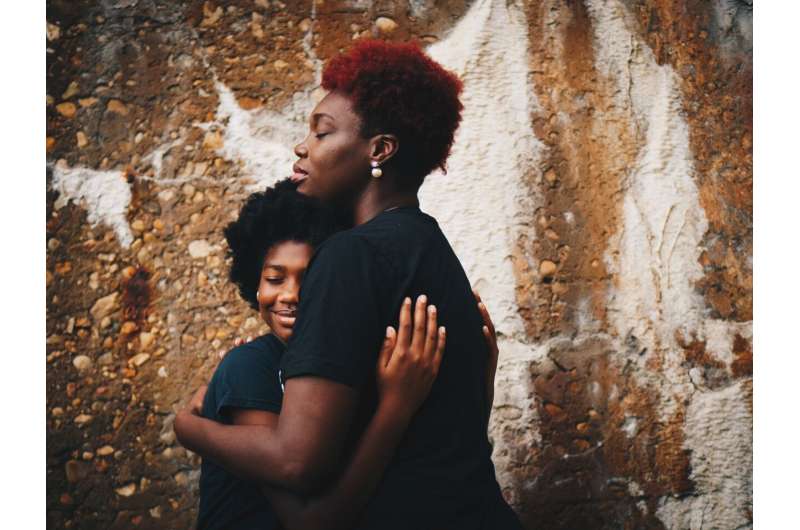This article has been reviewed according to Science X's editorial process and policies. Editors have highlighted the following attributes while ensuring the content's credibility:
fact-checked
trusted source
proofread
COVID-19 took a mental health toll on mothers, young women and adolescent girls, researchers find

Two recent studies show that the non-pharmaceutical public health measures implemented during the COVID-19 pandemic were associated with increased mental health visits for mothers with young children, young women and adolescent girls.
As governments around the world imposed public health measures to reduce viral transmission, including stay-at-home orders, travel restrictions, and school closures, experts raised concerns about the potential lasting impact on the mental health of individuals, especially those belonging to vulnerable and at-risk populations.
In particular, mothers with young children faced obstacles related to parenting and caregiving, while young women and adolescent girls experienced major disruptions to school, social and daily routines.
The new studies—which built on previous research showing the COVID-19 pandemic had a larger impact on the mental health of females compared to that of males—aimed to examine how these pandemic-related non-pharmaceutical interventions have impacted the mental health of these groups.
"This work raises concerns about how to contain and address this issue," says Geoffrey Anderson, a professor at the Dalla Lana School of Public Health's Institute of Health Policy, Management and Evaluation (IHPME) and lead of the pandemic recovery theme at the Institute for Pandemics—a University of Toronto institutional strategic initiative.
"The current road towards pandemic recovery needs to consider these at-risk populations. If not, there could be dire long-term consequences for the current generation and ones to come."
The research team also included: John Moin, a research methods specialist at the Center for Addiction and Mental Health (CAMH) and former IHPME postdoctoral researcher; Shauna Brail, an associate professor at U of T Mississauga who directs the Institute for Management & Innovation; and Simone Vigod, head of the department of psychiatry at Women's College Hospital and a professor in the department of psychiatry in the Temerty Faculty of Medicine.
The two studies compared data of mental health visits before and during the pandemic, from March 2016 to November 2021.
The first, published in the Canadian Medical Association Journal Open, found a peak in mental health service utilization from December 2020 to February 2021 for mothers of young children. Parents visited both primary care physicians and psychiatrists, with about two-thirds of total visits for mood, anxiety and depressive disorders, and about one-quarter for alcohol and substance abuse.
In the second study, published in the British Medical Journal Open, the team found an increase in mental health visits to primary care physicians and psychiatrists during the pandemic among female adolescents and young women. This trend was largely driven by services for mood, anxiety and depressive disorders. Additionally, hospital visits for eating disorders increased among adolescent females.
Both studies show that the implementation of public health measures during the pandemic was associated with increased usage of mental health services among mothers of young children, young women and adolescent girls, and point to potential lessons for future public health crises.
"We saw the rapid and ongoing application of non-pharmaceutical interventions as public health measures throughout the pandemic," says Moin. "We also now know that they were associated with abrupt and prolonged changes in the utilization of mental health services. This association should be considered for future public health planning and strategy."
Renzo Calderon, a postdoctoral researcher supervised by Anderson, is leading a team that is further exploring this observed trend.
Despite nearly four years having passed since the beginning of the restrictions, the pandemic continues to alter the landscape of mental health. Hence, the researchers' focus is not solely on exploring the overarching trends but also on identifying particularly vulnerable populations.
Preliminary results indicate that the demand for mental health services around specific issues such as eating disorders and substance abuse, especially among young women, has not yet diminished.
Such a targeted approach aims to uncover nuanced insights into how the COVID-19 pandemic exacerbated these problems and lead to more effective interventions.
More information: John S. Moin et al, Utilization of physician mental health services by birthing parents with young children during the COVID-19 pandemic: a population-based, repeated cross-sectional study, CMAJ Open (2023). DOI: 10.9778/cmajo.20220239
John S Moin et al, Sex differences among children, adolescents and young adults for mental health service use within inpatient and outpatient settings, before and during the COVID-19 pandemic: a population-based study in Ontario, Canada, BMJ Open (2023). DOI: 10.1136/bmjopen-2023-073616



















